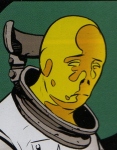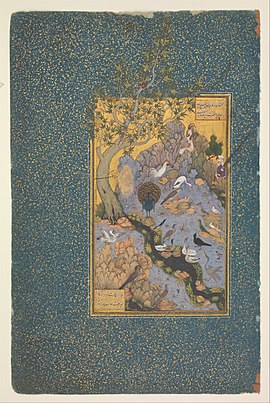- Hieronymous Alloy
- Jan 30, 2009
-

Why! Why!! Why must you refuse to accept that Dr. Hieronymous Alloy's Genetically Enhanced Cream Corn Is Superior to the Leading Brand on the Market!?!


-
Morbid Hound
|
Welcome goonlings to the Awful Book of the Month!
In this thread, we choose one work of literature absolute crap and read/discuss it over a month. If you have any suggestions of books, choose something that will be appreciated by many people, and has many avenues of discussion. We'd also appreciate if it were a work of literature complete drivel that is easily located from a local library or book shop, as opposed to ordering something second hand off the internet and missing out on a week's worth of reading. Better yet, books available on e-readers.
Resources:
Project Gutenberg - http://www.gutenberg.org
- A database of over 17000 books available online. If you can suggest books from here, that'd be the best.
SparkNotes - http://www.sparknotes.com/
- A very helpful Cliffnotes-esque site, but much better, in my opinion. If you happen to come in late and need to catch-up, you can get great character/chapter/plot summaries here.
 For recommendations on future material, suggestions on how to improve the club, or just a general rant, feel free to PM me. For recommendations on future material, suggestions on how to improve the club, or just a general rant, feel free to PM me. 
Past Books of the Month
[for BOTM before 2014, refer to archives]
2014:
January: Ursula K. LeGuin - The Left Hand of Darkness
February: Mikhail Bulgalov - Master & Margarita
March: Richard P. Feynman -- Surely You're Joking, Mr. Feynman!
April: James Joyce -- Dubliners
May: Gabriel Garcia Marquez -- 100 Years of Solitude
June: Howard Zinn -- A People's History of the United States
July: Mary Renault -- The Last of the Wine
August: Barbara Tuchtman -- The Guns of August
September: Jane Austen -- Pride and Prejudice
October: Roger Zelazny -- A Night in the Lonesome October
November: John Gardner -- Grendel
December: Christopher Moore -- The Stupidest Angel
2015:
January: Italo Calvino -- Invisible Cities
February: Karl Ove Knausgaard -- My Struggle: Book 1.
March: Knut Hamsun -- Hunger
April: Liu Cixin -- 三体 ( The Three-Body Problem)
May: John Steinbeck -- Cannery Row
June: Truman Capote -- In Cold Blood
(Hiatus)
August: Ta-Nehisi Coates -- Between the World and Me
September: Wilkie Collins -- The Moonstone
October:Seth Dickinson -- The Traitor Baru Cormorant
November:Svetlana Alexievich -- Voices from Chernobyl
December: Michael Chabon -- Gentlemen of the Road
2016:
January: Three Men in a Boat (To say nothing of the Dog!) by Jerome K. Jerome
February:The March Up Country (The Anabasis) of Xenophon
March: The Name of the Rose by Umberto Eco
April: Plain Tales from the Hills by Rudyard Kipling
May: Temple of the Golden Pavilion by Yukio Mishima
June:The Vegetarian by Han Kang
July:Lud-in-the-Mist by Hope Mirrlees
August: Pale Fire by Vladimir Nabokov
September:Siddhartha by Herman Hesse
October:Right Ho, Jeeves by P.G. Wodehouse
November:Kitchen Confidential by Anthony Bourdain
December: It Can't Happen Here by Sinclair Lewis
2017:
January: Mother Night by Kurt Vonnegut
February: The Plague by Albert Camus
March: The Dispossessed by Ursula K. LeGuin
Current:
The Conference of the Birds (مقامات الطیور) by Farid ud-Din Attar

Book available here:
http://persian.packhum.org/persian/main?url=pf%3Ffile%3D02602030%26ct%3D0
http://thekingdomwithin.net/wp-content/uploads/2015/03/The_Conference_of_the_Birds_Fardiuddin_Attar.pdf
https://www.amazon.com/dp/B06XBJ5LS8/ref=dp-kindle-redirect?_encoding=UTF8&btkr=1
About the book:
quote:
The Conference of the Birds or Speech of the Birds (Persian: منطق الطیر, Manṭiq-uṭ-Ṭayr, also known as مقامات الطیور Maqāmāt-uṭ-Ṭuyūr; 1177), is a celebrated literary masterpiece of Persian literature by poet Farid ud-Din Attar, commonly known as Attar of Nishapur.
In the poem, the birds of the world gather to decide who is to be their king, as they have none. The hoopoe, the wisest of them all, suggests that they should find the legendary Simorgh, a mythical Persian bird roughly equivalent to the western phoenix. The hoopoe leads the birds, each of whom represent a human fault which prevents man from attaining enlightenment. From the many birds that begin the journey, only thirty birds are left that finally reach the dwelling place of the Simorgh. There, the birds see the Simorgh in the reflection of their faces of an implicit lake.[1][2]
If Simorgh unveils its face to you, you will find
that all the birds, be they thirty or forty or more,
are but the shadows cast by that unveiling.
What shadow is ever separated from its maker?
Do you see?
The shadow and its maker are one and the same,
so get over surfaces and delve into mysteries. [3]
The seven valleys the birds cross are as follows:
1. Valley of the Quest, where the Wayfarer begins by casting aside all dogma, belief, and unbelief.
2. Valley of Love, where reason is abandoned for the sake of love.
3. Valley of Knowledge, where worldly knowledge becomes utterly useless.
4. Valley of Detachment, where all desires and attachments to the world are given up. Here, what is assumed to be “reality” vanishes.
5. Valley of Unity, where the Wayfarer realizes that everything is connected and that the Beloved is beyond everything, including harmony, multiplicity, and eternity.
6. Valley of Wonderment, where, entranced by the beauty of the Beloved, the Wayfarer becomes perplexed and, steeped in awe, finds that he or she has never known or understood anything.
7. Valley of Poverty and Annihilation, where the self disappears into the universe and the Wayfarer becomes timeless, existing in both the past and the future.[4]
About the Author
quote:
Abū Ḥamīd bin Abū Bakr Ibrāhīm (c. 1145 – c. 1221; Persian: ابو حامد بن ابوبکر ابراهیم), better known by his pen-names Farīd ud-Dīn (فرید الدین) and ʿAṭṭār (عطار, Attar means pharmacist or perfumer), was a Persian[2][3][4] Sunni[5] Muslim poet, theoretician of Sufism, and hagiographer from Nishapur who had an immense and lasting influence on Persian poetry and Sufism.
. . .
Information about Attar's life is rare and scarce. He is mentioned by only two of his contemporaries, `Awfi and Tusi. However, all sources confirm that he was from Nishapur, a major city of medieval Khorasan (now located in the northeast of Iran), and according to `Awfi, he was a poet of the Seljuq period.
Themes and Background
quote:
Attar's masterful use of symbolism is a key, driving component of the poem. This adroit handling of symbolisms and allusions can be seen reflected in these lines:
It was in China, late one moonless night, The Simorgh first appeared to mortal sight – Beside the symbolic use of the Simorgh, the allusion to China is also very significant. According to Idries Shah, China as used here, is not the geographical China, but the symbol of mystic experience, as inferred from the Hadith (declared weak by Ibn Adee, but still used symbolically by some Sufis): "Seek knowledge; even as far as China".[5] There are many more examples of such subtle symbols and allusions throughout the Mantiq. Within the larger context of the story of the journey of the birds, Attar masterfully tells the reader many didactic short, sweet stories in captivating poetic style. The book is meant to be not only instructive but also entertaining.
quote:
The thoughts depicted in `Attar's works reflects the whole evolution of the Sufi movement. The starting point is the idea that the body-bound soul's awaited release and return to its source in the other world can be experienced during the present life in mystic union attainable through inward purification.[11] In explaining his thoughts, 'Attar uses material not only from specifically Sufi sources but also from older ascetic legacies. Although his heroes are for the most part Sufis and ascetics, he also introduces stories from historical chronicles, collections of anecdotes, and all types of high-esteemed literature.[3] His talent for perception of deeper meanings behind outward appearances enables him to turn details of everyday life into illustrations of his thoughts. The idiosyncrasy of `Attar's presentations invalidates his works as sources for study of the historical persons whom he introduces. As sources on the hagiology and phenomenology of Sufism, however, his works have immense value.
Judging from `Attar's writings, he approached the available Aristotelian heritage with skepticism and dislike.[12][13] Interestingly, he did not seem to want to reveal the secrets of nature. This is particularly remarkable in the case of medicine, which fell well within the scope of his professional expertise as pharmacist. He obviously had no motive for sharing his expert knowledge in the manner customary among court panegyrists, whose type of poetry he despised and never practiced. Such knowledge is only brought into his works in contexts where the theme of a story touches on a branch of the natural sciences.
quote:
according to Edward G. Browne, Attar as well as Rumi and Sana'i were all Sunni Muslims, as evident from the fact that their poetry abounds with praise for the first two caliphs Abu Bakr and Umar ibn al-Khattāb - who are detested by Shia Islam.[14] According to Annemarie Schimmel, the tendency among Shia authors to include leading mystical poets such as Rumi and Attar among their own ranks, became stronger after the introduction of Twelver Shia as the state religion in the Safavid Empire in 1501.[15]
Pacing
Just read, then Post.
Please bookmark the thread to encourage discussion.
References and Further Reading
https://en.wikipedia.org/wiki/Rumi
https://en.wikipedia.org/wiki/Omar_Khayyam (Same town, died about 30 years before Attar)
https://en.wikipedia.org/wiki/Sufism
https://en.wikipedia.org/wiki/Parlement_of_Foules (Chaucer also wrote a Parliament of Birds, about 200 years later)
Final Note:
Thanks, and I hope everyone enjoys the book!
|
 #
¿
Apr 9, 2017 21:37
#
¿
Apr 9, 2017 21:37
|
|
- Adbot
-
ADBOT LOVES YOU
|

|
|
#
¿
May 16, 2024 12:16
|
|
- Hieronymous Alloy
- Jan 30, 2009
-

Why! Why!! Why must you refuse to accept that Dr. Hieronymous Alloy's Genetically Enhanced Cream Corn Is Superior to the Leading Brand on the Market!?!


-
Morbid Hound
|
Oh, this actually exists. I think I ran into this in a Borges story so I was kind of dubious, this being April and all.
Oh nice catch!
But looks like it's from Borges' Collected Non-Fictions
quote:
The faraway king of all the birds, the Simurgh, lets fall a magnificent feather in the center of China: tired of their age-old anarchy, the birds resolve to go in search of him. They know that their king’s name means thirty birds; they know his palace is located on the Kaf, the circular mountain that surrounds the earth.
They embark upon the nearly infinite adventure. They pass through seven valleys or seas; the name of the penultimate is Vertigo; the last, Annihilation. Many pilgrims give up; others perish. Thirty, purified by their efforts, set foot on the mountain of the Simurgh. At last they gaze upon it: they perceive that they are the Simurgh and that the Simurgh is each one of them and all of them. In the Simurgh are the thirty birds and in each bird is the Simurgh.
http://aphelis.net/borges-simurgh/
|
 #
¿
Apr 11, 2017 05:34
#
¿
Apr 11, 2017 05:34
|
|
 For recommendations on future material, suggestions on how to improve the club, or just a general rant, feel free to PM me.
For recommendations on future material, suggestions on how to improve the club, or just a general rant, feel free to PM me. 






